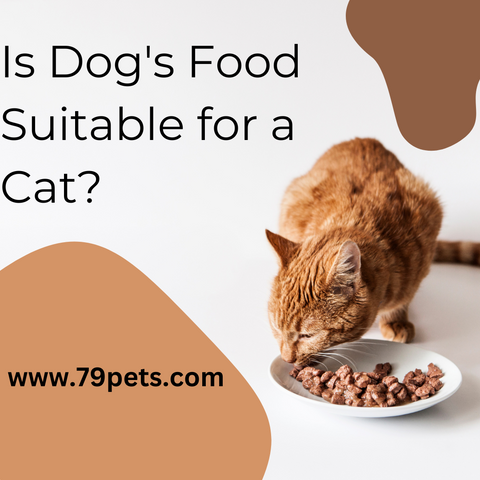
Has your feline companion sneaked a taste of your canine's meal, leaving you pondering its potential harm? While cats and dogs often peacefully cohabit when raised together, sharing food might not be the wisest choice. Despite the apparent similarity in ingredients between their respective diets, it's crucial to understand why mixing their meals isn't advisable.
Expert opinion suggests that the occasional nibble from a dog's dish might not immediately harm a cat; over time, it can damage their well-being. Regular dog food consumption can lead to malnutrition, digestive issues, and even kidney failure in cats, underscoring the importance of maintaining separate feeding routines for our furry friends.
This blog will explore the reasons why cats should avoid dog food, explore the distinctions between canine and feline diets, and uncover the optimal nutrition for our beloved cats.
Why Can Cats Not Eat Dog Food?
Felines and canines march to the beat of different dietary drums, rendering it unwise for cats to indulge in dog food. The dissimilarities stem from their evolutionary backgrounds and digestive mechanisms.
Cats, being obligate carnivores, necessitate a diet primarily composed of meat, with protein and fat taking center stage, constituting around 70% of their meal. Conversely, as omnivores, dogs possess a more versatile palate, capable of digesting grains and other ingredients that may not sit well with their feline counterparts. This stark contrast underscores the importance of tailoring their diets to suit their distinct nutritional needs.
What Will Happen If Cat Eat Dog Food?
Since dog food is meticulously crafted to meet canines' nutritional requirements, it inevitably falls short of meeting the needs of our feline companions. Cats' digestive systems are finely tuned to process animal-based proteins and fats, nutrients often lacking in dog food formulations.
Moreover, certain ingredients in some dog foods pose significant health risks to cats. Substances like onions, garlic, and raisins, which are benign for dogs, can prove toxic to felines, potentially leading to grave conditions such as anemia and kidney failure. Additionally, cats exhibit a lower carbohydrate tolerance than their canine counterparts. A diet rich in grains and other carbohydrates can predispose cats to obesity, diabetes, and other health issues, highlighting the importance of providing them with a nutritionally tailored diet.
What Cat Needs To Eat?
Being obligate carnivores, cats have specific dietary requirements crucial for their well-being. The Cornell Feline Health Center underscores the importance of providing cats with:
- Protein from fish or meat
- Minerals
- Fatty acids
- Vitamins
- Amino acids like taurine and arginine (from fish or meat)
- Water
Experts suggest that approximately 35 to 45 percent of a cat's diet should consist of protein to meet their nutritional needs. This emphasizes the significance of sourcing and formulating cat food that aligns with their predatory nature.
Difference Between Cat And Dog Food?
While dog food is formulated to accommodate the omnivorous nature of dogs, containing proteins along with grains and vegetables to fulfill their dietary needs, feline nutrition takes a markedly different path. As strict carnivores, cats thrive on diets predominantly composed of proteins devoid of grains or vegetables.
Although carbohydrates like rice and corn can be provided to cats in limited amounts, they are not essential to their diet. Conversely, carbohydrates play a crucial role in meeting dogs' dietary requirements, underlining the divergence in nutritional needs between these two beloved pet species.
What Should I Feed My Cat If I Run Out Of Cat Food?
If your feline friend has polished off their meal quicker than anticipated, consider them some human foods as a treat. Here's a list of human foods that are safe to share with your kitty:
- Peas
- Salmon
- Cooked Chicken
- Berries
- Spinach
- Cooked/ Plain Pumpkin
- Cheese
- Bananas
- Cooked Turkey
- Cooked Eggs
- Yogurt
- Oatmeal
Foods Which Are Not Safe For Cats
Certain foods pose significant risks to cats due to their toxicity. Chocolate and onions, for instance, contain substances harmful to felines and should be strictly avoided. Additionally, while it may seem like a treat, cow's milk is not well-tolerated by many cats and can result in stomach upsets or digestive discomfort if consumed in large quantities.
How To Feed Cat And Dog Together?
Feeding multiple pets can pose challenges, especially when dogs and cats become curious about each other's food.
Here are some strategies to help ensure that your pets stick to their meals:
- Designate specific feeding areas for each pet to prevent confusion.
- Establish distinct feeding times for dogs and cats to minimize the likelihood of food swapping.
- Consider using elevated food bowls or automatic feeders tailored to each pet's needs. This will further reduce the temptation to sample each other's meals.
The Bottom Line
Although occasional nibbles of dog food may not immediately harm cats, it's imperative to ensure they receive essential nutrients from their diet consistently to maintain their health. If your cat persists in consuming dog food, seeking guidance from a veterinarian is crucial to determine the underlying cause and address any potential health concerns.






